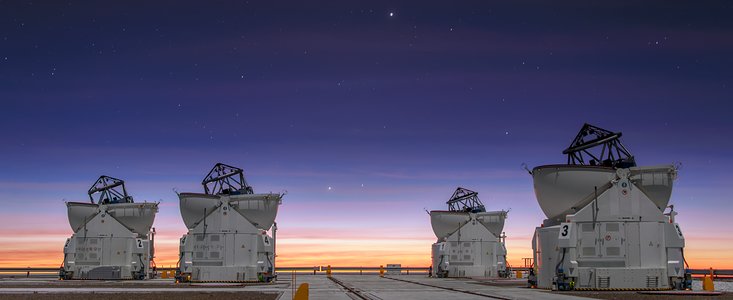Announcement
NAOMI Sees First Light
New cutting-edge adaptive optics module for ESO’s Very Large Telescope Interferometer
7 December 2018
The New Adaptive Optics Module for Interferometry (NAOMI) has seen first light after being installed on all four 1.8-metre Auxiliary Telescopes (ATs) of ESO’s Very Large Telescope Interferometer (VLTI) at the Paranal Observatory in Chile. By introducing state-of-the-art adaptive optics technology, NAOMI has improved the imaging capabilities of the VLTI to unprecedented levels, giving the VLTI’s powerful scientific instruments such as GRAVITY a clearer view of the Universe than ever.
The VLTI is a mode of ESO’s Very Large Telescope (VLT) that can combine up to all four ATs or the 8.2-metre Unit Telescopes of the VLT to create a virtual telescope with a diameter of up to 130 metres, allowing incredibly high-resolution observations. Using the VLTI, astronomers can study stellar surfaces, active galactic nuclei, young stars, and a variety of other intriguing astronomical objects.
To combat the effects of atmospheric turbulence on the quality of the observations performed by the VLTI, ESO has developed the new adaptive optics system named NAOMI. The system was constructed to improve the sensitivity and performance of the VLT’s ATs in collaboration with the Institut de Planétologie et d’Astrophysique de Grenoble (Centre National de la Recherche Scientifique/Université Grenoble Alpes).
Developing NAOMI was a tremendously technically challenging endeavour. “The newly installed modules have to concentrate light into optical fibres only a few microns wide — barely a tenth of the width of a human hair!” explained Jean-Philippe Berger of the IPAG. “We also faced the formidable challenge of installing the four adaptive optics systems as quickly as possible in order not to disturb VLTI observations.”
Previously, the ATs were equipped with the less sophisticated STRAP system (System for Tip/tilt Removal with Avalanche Photodiodes), which observed the effects of atmospheric turbulence and corrected the tilt of the received wavefronts by rapidly adjusting a steering mirror. Despite the valuable corrections it provided under good atmospheric conditions, image quality decreased significantly when conditions were poor.
“Observing with the VLTI on the ATs was heavily dependent on atmospheric conditions and after every sunset we would anxiously wait to see if it would be a lucky night,” explained Julien Woillez, the VLTI Project Scientist. “NAOMI is changing all this — we can now observe efficiently even in less good seeing conditions.”
By using an advanced adaptive optics system [1], NAOMI will improve the precision of the measurements performed by the VLTI and achieve a better and more stable image quality. The VLTI’s razor-sharp new adaptive optics will enable efficient, long integrations even in degraded seeing — bringing out the best of the VLTI instruments under all atmospheric conditions.
“On some nights it looks like the atmosphere is virtually gone! We can now observe much fainter objects,” concluded Woillez. “With NAOMI, we can now use cutting-edge second-generation instruments like PIONIER, GRAVITY, and MATISSE to their full potential.”
Notes
[1] A key component of the NAOMI module is a deformable mirror from the company ALPAO — in a feat of optical engineering, the shape of this mirror is updated 500 times per second, ensuring that the VLTI’s view is almost free of atmospheric turbulence.
Links
- More information about NAOMI
- Engineering paper presenting NAOMI
- Engineering paper presenting NAOMI’s deformable mirror
Contacts
Calum Turner
ESO Public Information Officer
Garching bei München, Germany
Tel: +49 89 3200 6670
Email: pio@eso.org
About the Announcement
| Id: | ann18089 |
Our use of Cookies
We use cookies that are essential for accessing our websites and using our services. We also use cookies to analyse, measure and improve our websites’ performance, to enable content sharing via social media and to display media content hosted on third-party platforms.
ESO Cookies Policy
The European Organisation for Astronomical Research in the Southern Hemisphere (ESO) is the pre-eminent intergovernmental science and technology organisation in astronomy. It carries out an ambitious programme focused on the design, construction and operation of powerful ground-based observing facilities for astronomy.
This Cookies Policy is intended to provide clarity by outlining the cookies used on the ESO public websites, their functions, the options you have for controlling them, and the ways you can contact us for additional details.
What are cookies?
Cookies are small pieces of data stored on your device by websites you visit. They serve various purposes, such as remembering login credentials and preferences and enhance your browsing experience.
Categories of cookies we use
Essential cookies (always active): These cookies are strictly necessary for the proper functioning of our website. Without these cookies, the website cannot operate correctly, and certain services, such as logging in or accessing secure areas, may not be available; because they are essential for the website’s operation, they cannot be disabled.
Functional Cookies: These cookies enhance your browsing experience by enabling additional features and personalization, such as remembering your preferences and settings. While not strictly necessary for the website to function, they improve usability and convenience; these cookies are only placed if you provide your consent.
Analytics cookies: These cookies collect information about how visitors interact with our website, such as which pages are visited most often and how users navigate the site. This data helps us improve website performance, optimize content, and enhance the user experience; these cookies are only placed if you provide your consent. We use the following analytics cookies.
Matomo Cookies:
This website uses Matomo (formerly Piwik), an open source software which enables the statistical analysis of website visits. Matomo uses cookies (text files) which are saved on your computer and which allow us to analyze how you use our website. The website user information generated by the cookies will only be saved on the servers of our IT Department. We use this information to analyze www.eso.org visits and to prepare reports on website activities. These data will not be disclosed to third parties.
On behalf of ESO, Matomo will use this information for the purpose of evaluating your use of the website, compiling reports on website activity and providing other services relating to website activity and internet usage.
Matomo cookies settings:
Additional Third-party cookies on ESO websites: some of our pages display content from external providers, e.g. YouTube.
Such third-party services are outside of ESO control and may, at any time, change their terms of service, use of cookies, etc.
YouTube: Some videos on the ESO website are embedded from ESO’s official YouTube channel. We have enabled YouTube’s privacy-enhanced mode, meaning that no cookies are set unless the user actively clicks on the video to play it. Additionally, in this mode, YouTube does not store any personally identifiable cookie data for embedded video playbacks. For more details, please refer to YouTube’s embedding videos information page.
Cookies can also be classified based on the following elements.
Regarding the domain, there are:
- First-party cookies, set by the website you are currently visiting. They are stored by the same domain that you are browsing and are used to enhance your experience on that site;
- Third-party cookies, set by a domain other than the one you are currently visiting.
As for their duration, cookies can be:
- Browser-session cookies, which are deleted when the user closes the browser;
- Stored cookies, which stay on the user's device for a predetermined period of time.
How to manage cookies
Cookie settings: You can modify your cookie choices for the ESO webpages at any time by clicking on the link Cookie settings at the bottom of any page.
In your browser: If you wish to delete cookies or instruct your browser to delete or block cookies by default, please visit the help pages of your browser:
Please be aware that if you delete or decline cookies, certain functionalities of our website may be not be available and your browsing experience may be affected.
You can set most browsers to prevent any cookies being placed on your device, but you may then have to manually adjust some preferences every time you visit a site/page. And some services and functionalities may not work properly at all (e.g. profile logging-in, shop check out).
Updates to the ESO Cookies Policy
The ESO Cookies Policy may be subject to future updates, which will be made available on this page.
Additional information
For any queries related to cookies, please contact: pdprATesoDOTorg.
As ESO public webpages are managed by our Department of Communication, your questions will be dealt with the support of the said Department.


